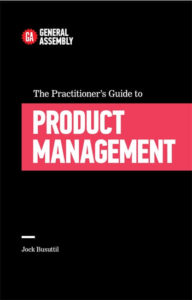
PRODUCTHEAD: It’s okay to be proud of your achievements
PRODUCTHEAD is a regular newsletter of product management goodness,
curated by Jock Busuttil.
a product at a wedding (no no no no no no no no)
tl;dr
To earn trust you need people to know what you’ve achieved
Weeknotes are a way to work in the open, reflect and attain a sense of achievement
Being trusted makes it easier for you to carve out the space your team needs to succeed
a favour: please share this with other product people
every PRODUCTHEAD edition is online for you to refer back to
hello
This week I was chatting with someone who was both a little irked and envious that the people in their company who were best at self-promotion tended also to be the ones that were awarded the plum projects. At the same time, they also felt uncomfortable about talking about what they’d achieved.
I could certainly empathise with them — I remember keenly how annoying it was to do the legwork on something, only for someone peripherally involved to sweep in and claim the credit. In fact, I wrote about it way back in 2012.
The uncomfortable feeling they described was also something I’d struggled with. In 2015, my book, The Practitioner’s Guide To Product Management was published. For years after I felt tremendously awkward about this fact, not for any good reason, but just because I thought it almost crass to have achieved something.
I would express this by belittling the book and joking about it: I distinctly remember recommending it to someone as a good way to stop a table from wobbling; on other occasions I suggested that me signing the book would probably reduce its resale value.
Even with the help of good friends continually pointing out how absurd I was to do that, and that it was okay to be proud of my achievement, it has taken me several years to become comfortable with the fact that I wrote a good book and it was published. Judge for yourself.
Controlling your own narrative #
In an ideal world, the way your manager or company would assess your performance would not require you to point out your achievements to them — they would already know and reward you fairly in return.
The problem is that the processes and people involved are far from perfect. A lot of decisions about who tackles what products or projects ends up being made on the basis of perception (what people see you as, which doesn’t always correspond to your capabilities) and sometimes also recency bias.
You can’t always rely on your manager to act as your cheerleader and put your name forward for things, so you have to take that responsibility on yourself.
Some people inflate their contributions and take credit for other people’s work. Clearly this is not behaviour to emulate (for one, karma’s a bitch), but this background noise is the context which your story needs to overcome to be heard.
So we have to help things along a little. We need to take control of our own narrative, or risk someone else dictating it for us. That means reminding people of our contributions and achievements, but without misrepresenting ourselves or taking undue credit.
It’s okay to be proud of your achievements and to take credit for your own hard work.
Earning trust #
Talking about your achievements is not just a contributing factor to that next promotion or interesting project. I would argue that it’s intrinsic to being able to operate as a product manager. Let me explain.
As product people, we spend a great deal of our time influencing without authority in order to get people and things to work in harmony. This important aspect of the role necessitates others to trust us, not blindly, but to do our job well. Things flow more easily if people are content you’re going to handle something without fuss and achieve good results. Without that trust, everything is a struggle.
The way to earn trust, and in turn permission to work on bigger and better things, is to continually reinforce the (hopefully accurate) perception that you get things done and are a safe pair of hands. At the most basic level, we need people to believe that we will do what we say we’re going to do. And you can only demonstrate this if people know what you’re up to.
Lifting the veil #
In particular, it is important to provide helpful context for people who aren’t as close to the day-to-day work as you are.
To an outside perspective, it may look like it’s taken you and your team ages to get from A to B, but what they’re not seeing is the massive ravine between A and B that you’ve either had to bridge or circumnavigate.
What product managers do is hard, takes time and skill, and has many complex, moving parts. Others don’t always see this. Lift the veil.
As you become more senior and responsible for a team of people, either as their manager or as a senior individual contributor, your own reputation reflects to an extent on your team.
If you are seen as a safe pair of hands, you’ll be better equipped to grease the bureaucratic cogs for your team, clear obstacles and carve out the space your team needs to do their work. Your team will thank you for it and deliver better work.
It’s therefore important to work on how stakeholders see you, if for no other reason than to help your team to deliver more effectively.
An intervention to try: weeknotes #
Weeknotes are a simple, quick journal you do on a Friday afternoon to reflect on the week just gone. Block some time out to write them, but keep them brief so that they’re not a chore either for you to write or for others to read. Think of them like you’re writing a note to your future self.
You can use weeknotes as a way of achieving a few things:
1. They’re a helpful way to reflect on what you’ve done over the last week, which in itself helps you to get some closure on the working week. It’s okay for some weeks to be more productive than others, so don’t beat yourself up if you feel like things haven’t progressed. It will be different the next week.
2. Over time, you build up a handy journal of your achievements to remind you when it comes to your periodic performance appraisal. It saves loads of time and mental energy gathering the evidence you need to support your appraisal rating.
3. You can start sharing them with a wider audience as a way of working in the open, and of providing summary information for stakeholders who are not as close to the day-to-day work as they would like to be. The worst that can happen is that they ask you not to send the emails to them — and that’s fine also.
4. By sharing them on a weekly basis, you’re helping to counteract recency bias. You want to remind people you exist, and that you’re doing great work on their behalf.
If you’re feeling a little uncomfortable about sharing your weeknotes, use them to also to share the achievements of your team, giving credit where due. That will help to reframe it as something you’re doing to benefit your team, and lessen your sense of it being gratuitous self-promotion.
They’re also a great way to say thanks to stakeholders who have helped you out in some way. A bit of public recognition goes a long way to building goodwill.
Final thoughts #
Communication skills are core to an effective product manager. Making you and your team’s achievements visible in your organisation is not about bragging or self-promotion, but about earning the trust you require to create the product your users need. And if doing so helps to balance out the noise of self-promoters and virtue-signallers, then so much the better.
Speak to you soon,
Jock
what to think about this week
The why of weeknotes
If you have found your way here, it’s possible that you already write Weeknotes, have an interest starting, or maybe you’re just interested in what other people do for a living.
Make connections across boundaries
[Sam Villis / Medium]
Web of weeknotes
An aggregator site for people who publish their weeknotes. The authors are mostly people who have driven the digital revolution in the UK’s public sector.
Blogposts about digital people’s working weeks
[Medium]
Blow your own trumpet
If you’ve worked in product management for a while, you’ll almost certainly have been annoyed by others taking credit for your hard work. Everyone conveniently ignores that you held their hand to all the customer meetings, wrote AND DELIVERED the pitch to the customer, rearranged your roadmap to squeeze in some customer-specific features, and basically did everything needed to secure the deal. But the main reason nobody else knows this is because you didn’t actually tell anyone!
[Jock Busuttil / I Manage Products]
6 ways to make performance reviews more fair
The performance-review process is more biased than people like to believe, with consequences that are harmful to employees and organizations alike. And it’s not just the managers conducting the reviews who allow their biases to creep in. Employees do it too, in ways that can harm their own prospects. This article identifies several common sources of bias in the performance-review process and suggests six practices rooted in behavioral science that can help keep bias at bay.
Keep a journal to counter recency bias
[Paola Cecchi-Dimeglio / Harvard Business Review]
recent posts
An exercise in stakeholder alignment
When your stakeholders each have their own interpretations of the product strategy, this lack of stakeholder alignment will cause you no end of problems. Here’s what you can do about it.
A practical exercise you can run
[I Manage Products]
The 4 unintended side-effects of risk aversion and what to do about them
When we become more worried about risk, four unintended things also tend to happen: bottlenecking, erosion of trust, ossification of process, and a risk appetite that tends towards zero. Here’s what you can do about them.
[I Manage Products]
The agency trap
How can product management fit into an agency business model when requirements or specifications are often contractually set in stone by the client up-front? Spoiler alert: not easily
[I Manage Products]
can we help you?
Product People is a product management services company. We can help you through consultancy, training and coaching. Just contact us if you need our help!
Helping people build better products, more successfully, since 2012.
PRODUCTHEAD is a newsletter for product people of all varieties, and is lovingly crafted from unexpected handmade gifts.


Leave a Reply